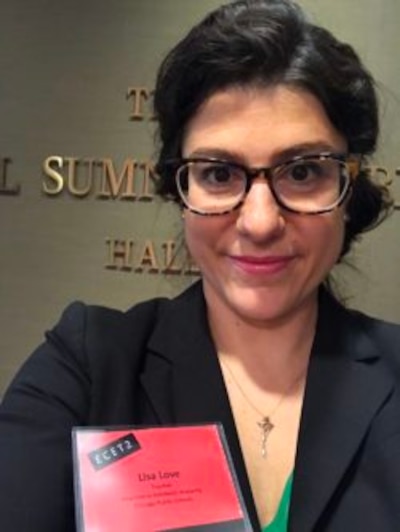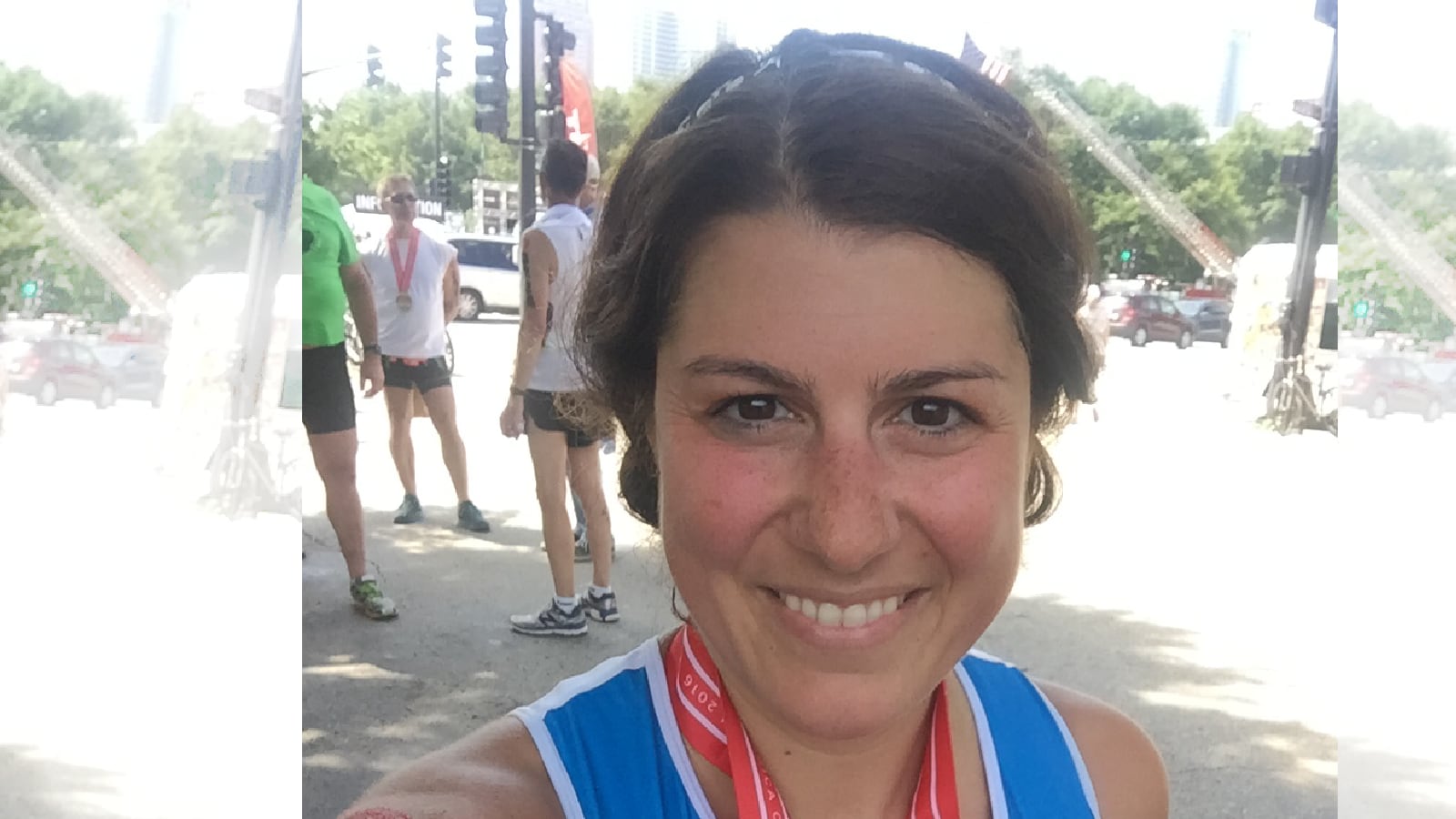How do teachers captivate their students? Welcome to Chalkbeat Chicago’s first installment of How I Teach, a feature in which we ask great educators how they approach their jobs. Have a recommendation of someone we should profile? Write us at chicago.tips@chalkbeat.org.
Lisa Caputo Love began her Chicago Public Schools career as a classroom teacher in 2005. But two years in, she realized that her most challenging assignment was reaching the learners who struggled the most. So she went back to school, earning a master’s degree in special education from Loyola University Chicago. And this past February, she was named the Chicago Foundation for Education’s 2018 Teacher of the Year.
Today she’s a learning behavior specialist at Hawthorne Scholastic Academy, a magnet school on the city’s North Side. In the Q and A that follows, she describes the moment she decided to become a teacher; the tightrope act that is supporting, yet challenging, students with special needs; and how she’s combatting “compassion fatigue” with more self-care and fun.
Interviews have been condensed and lightly edited.
Was there a moment when you decided to become a teacher?
As a child, my sister had a bad experience with a teacher. It significantly impacted her relationship with school for the rest of her life. My sister is an extremely intelligent, dedicated, and hardworking individual, yet that teacher made her feel otherwise. That experience taught me how much a teacher can influence a person’s life path, positively or negatively. My grandmother has always taught me to be thankful for my blessings, so social justice is in my veins. I love learning, and teaching is my way to pass along my passion. I’ve always wanted to help make the world a better place, and I believe that knowledge is power. My way to “think globally, act locally” is to foster students’ individual strengths and teach perseverance and coping mechanisms that will help my students overcome hurdles for the rest of their lives.
What made you decide to move into teaching special education?
I spent my first two years as a general education teacher, and self-reflection is a trait that I seek to model for my students. I felt that the area where I was most challenged was meeting the needs of struggling learners in my classroom. I earned my master’s degree in special education (from Loyola University Chicago; I also have a master’s in instructional leadership from the University of Illinois at Chicago and a master’s in educational leadership from the American College of Education) because I wanted to ensure that my most at-risk students were receiving the best education possible. All too often these students do not receive the interventions and support endorsed by research, thus perpetuating cycles of social, economic, and racial injustice.
How do you get to know your students?
Getting to know my students takes time and intentional interactions. Every student is different, and therefore I have to use a variety of techniques to learn more about who they are, who they want to be, and what they need from me to get there. I give them multiple opportunities to connect, and I like to use surveys to help me gather information about their preferences for interaction. This allows me to differentiate our communication.
For example, I talk and write with them individually, in small groups, and in large groups. I create lessons that encourage them to share and incorporate things they enjoy. I find the best way to connect with students is through sharing stories, pictures, and first-hand experiences like field trips, lunches, and before/after school extracurriculars. When you share in something beyond academics, you build trust and the personal connection that allows the students to be able to take academic risks and develop resilience in the classroom.
Tell us about a favorite lesson to teach. Where did the idea come from?
My favorite unit is the Chicago unit. I love Chicago history, so I really get really excited to teach the students about their hometown. We get to use a lot of primary sources, visit historical locations, and read fun historical fiction, which is my favorite genre (two recommendations: Philippa Gregory and Ken Follett). Every year I learn something new that I didn’t know the year before. The students love it, too, partially because it is universally interesting to all of them, and I think also because students mirror the mood of their teachers. When I am pumped about a topic, they can’t help but to be engaged.
What is something that other educators may not realize about teaching special education?

Being a special education teacher is difficult because you rarely make decisions alone. This can be a blessing and a curse. Not everyone considers what it is like to be an “outsider” coming into a classroom, and how important demonstrating equality between the teachers is when establishing classroom norms at the beginning of the year. When you are a general education teacher, if you want to try something new or you make an instruction decision, you tend to have that authority. As a special education teacher, there are usually several collaborators, so anything you do has to be run by at least one other person. I think it is great because it challenges me to be better at my job: I have the opportunity to witness so many different teaching styles and practices. But the collaboration dynamics are one of the more difficult aspects of my job.
What’s something happening in the community that affects what goes on inside your class?
Gun violence has come up as a topic of conversation a lot this year. Not only do students worry about shootings happening in their neighborhoods, they also worry about having an active shooter in our school. They often express frustration that policies and laws perpetuate access to weapons and they feel that as a society we are failing to meet the needs of those who suffer the most.
Tell us about a memorable time—good or bad—when contact with a student’s family changed your perspective or approach.
Last year, a student who I had taught my first year as a teacher contacted me and invited me to attend his high school graduation. The fact that I had such an impact on him during my first few years teaching really stuck with me. I didn’t think that I was that great back then, but it made me realize that I must have been doing something right. I did a lot of reflection as a result, and it really restored my passion for making learning fun.
What part of your job is most difficult?
I think the most difficult part of my job is finding the right balance between establishing high expectations and maintaining achievable goals for individual students. Special education teachers need to master this tightrope act while also demonstrating patience and assurance. If we push a student too hard, we can make them shut down or negatively impact their confidence or willingness to take academic risks. If we set our expectations too low, the student may not reach their full potential or learn how to engage in challenging tasks.
Additionally, teachers, especially special education teachers, are constantly exposed to the emotional and physical trauma of all their students. This makes teachers more likely to suffer from secondary trauma and/or compassion fatigue, which leads to great teachers burning out and leaving the field.
My favorite professor gave me an important piece of advice to live by: “If you don’t take care of yourself, you cannot take care of others.”
What was your biggest misconception that you initially brought to teaching?
Since I have pretty much always wanted to be a teacher, I thought it would be easy. Teaching is not easy. There is always something new to learn, you will always make mistakes, and it can be an isolating career. I believe like many things in life, the attitude you bring to the table and the people you surround yourself with can make or break you.
What are you reading for enjoyment?
This may sound like I’m making it up, but my favorite things to read these days are research articles and educational policy. I love learning about new teaching practices and proposed legislation. When I find legislation that I feel passionate about, I will read as many articles as I can about the topic so that I can advocate for or against it. I often send my teacher friends articles that I found interesting so that we can discuss them, or offer suggestions for new ideas to try in class. The topic I am currently researching is secondary trauma (or “vicarious trauma”) and teacher compassion fatigue. Teacher recruitment and retention is a really important issue right now, and I am working with a few different teams to brainstorm ways to address these systemic issues.
What’s the best advice you’ve received about teaching?
The best advice I’ve ever received about teaching was given to me by one of my mentor principals, Nate Pietrini (former principal of Hawthorne Scholastic Academy). He told me that as I grow as a teacher leader I should “seek to learn rather than tell.” Since I love learning about educational research and policy, I can sometimes be overly aggressive when implementing new techniques. By asking questions rather than telling about information I already know, I am able to make more educated decisions on my delivery and influence others at their own pace.
This mentality has also improved my interactions with my students because when I ask my struggling students questions instead of giving them answers, I help them to develop their critical thinking skills and increase their self-advocacy, ownership, and buy-in to the learning process. The Council for Exceptional Children has a list of “ethical principles” they suggest as guidelines for special education professionals. These guidelines focus a lot on not only providing high-quality, challenging expectations for individuals with disabilities, but also promoting and advocating for the development of inclusive and supportive environments. I take this call to action seriously, but it has taken (and continues to take) professional growth on my own part to engage with others to encourage such practices.
Have a recommendation of an educator we should profile? Write us at chicago.tips@chalkbeat.org.

